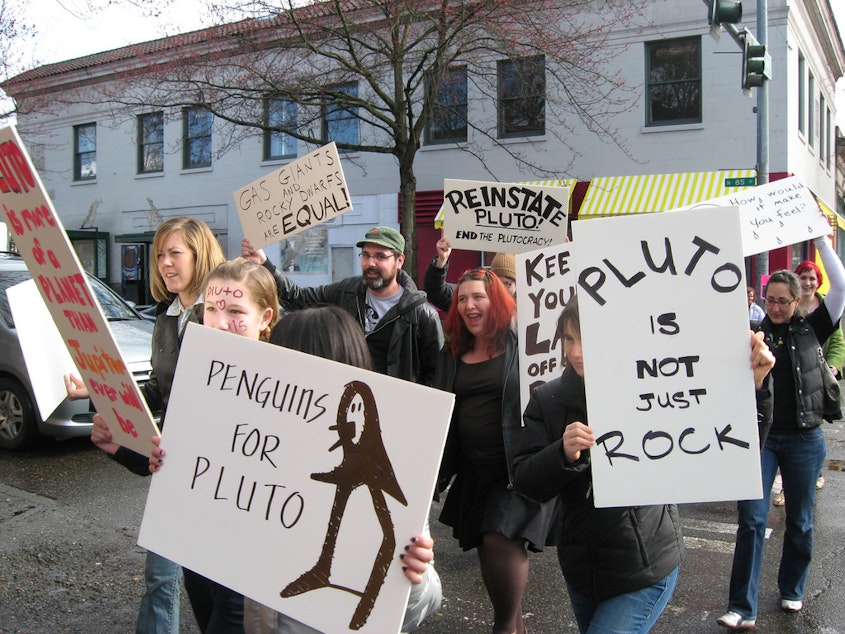In Trump era, a case for underdogs like Pluto

This essay, by former Mayor Mike McGinn, was first published in Encyclopedia Greenwoodia by the Greater Seattle Bureau of Fearless Ideas. We happened upon the small volume at a coffee shop and were taken by its message: Seattle is adamantly, defiantly pro-little guy.
There is one point I have to make before I can move on to discuss this book and The Greater Seattle Bureau of Fearless Ideas. Pluto is a planet.
In 2012 I attended the Pluto Protest on the streets of Greenwood. Pluto had recently lost its planetary status. The kids at the Bureau of Fearless Ideas held a debate on the topic, followed by a march, complete with chanting and signs, in front of the small businesses lining Greenwood Avenue.
Inspired by the protest and debate, I read a slender book, The Case for Pluto, by Alan Boyle. It was subtitled, “How a little planet made a big difference.”
One faction of scientists were “dynamicists.” They claimed that only a planet that “cleared all other objects from its path” was a planet. Big planets.
Sponsored
On the other side were the planetary scientists. Their view: “If it’s big enough to crush itself into a round shape due to gravity, it’s big enough to be a planet.” Put another way, what would Spock and Kirk say if they saw it from the bridge of the Enterprise? If it looks like a planet, it’s a planet.
The dynamicists demanded their due. At the international conference they put in their place all those asteroid and planetoid scientists – big planets ruled the roost and so did the dynamicists. Pluto was banished.
I knew what side I was on. I stood on the side of inclusion, not exclusion. For a rich, diverse view of the world where even a small body that shared an orbit could call itself a planet. And who were these scientists who thought they could define “planet?” That word belonged to the people, not just the scientists!
Now as photos come back from Pluto, it sure looks like a planet. No lumpy asteroid, it is beautifully round with distinctive geographic features. You can imagine Spock saying: “Captain, this is a class N planet. Our scans show no signs of sentient life.”
Okay, now what exactly does this have to with the Bureau of Fearless Ideas? Well, absolutely everything. A short stroll from my home opened a huge world of ideas, a vigorous debate, indeed the entire solar system. All bubbling out of a small storefront with the improbable title of a “Space Travel Supply Store.” Behind the facade are kids learning, exploring and expanding their own universes.
Sponsored
Tutoring is what brings them in. Then they venture outside for workshops and writing projects. They roam the neighborhood and meet the local businesspeople, artists, and chefs.
Their mission: conjure the past and future of Greenwood, come up with mysteries about the businesses, and imagine cool new neighborhood amenities. Perhaps a community swimming pool where you could get sushi, or a bunny cage where you could pet a bunny when you needed to chill out?
So the next time you are in our sleepy old trolley stop neighborhood of Greenwood, stop in the space travel supply store. And if you see kids (and grownups) marching up and down the street with signs saying “Pluto is a Planet,” join in. This is serious stuff, folks!
This essay was adapted from an essay titled “Regarding Greenwood and the Universe.” The author, Mike McGinn, was Seattle’s mayor from 2010 to 2014.
